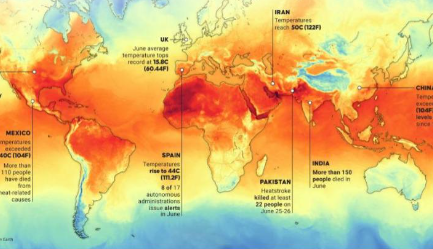2024 Became the Hottest Year Ever Recorded
The year 2024 is predicted to be the hottest year since the preindustrial period. The World Meteorological Organization (WMO) and the Copernicus Climate Change Service (C3S) report alarming temperature increases. Preliminary data indicates that the average global temperature may exceed 1.5°C above preindustrial levels. This trend is concerning and marks the urgent need for climate action.
Temperature Records and Analysis
Recent analysis shows that 2024 could break global temperature records for the second consecutive year. The C3S evaluated data from the first ten months of 2024. October was recorded at 1.65°C above preindustrial levels. This marks the 15th month in the last 16 where temperatures have exceeded the critical 1.5°C threshold. The average global temperature anomaly for 2024 has reached unprecedented levels.
Data Sources and Methodology
The WMO utilises various datasets to compile temperature records. These include data from NOAA, NASA, the UK Met Office, and other reputable sources. The datasets incorporate observational data and weather models. This combination allows for a comprehensive overview of global temperatures, including areas lacking observational sites.
Ocean Temperatures and Climate Impact
Ocean temperatures have also risen . In October 2024, average sea surface temperatures were 20.68°C in tropical and subtropical regions. This figure is nearly equivalent to the previous year’s record. Warmer oceans contribute to increased atmospheric moisture, intensifying extreme weather events worldwide.
Extreme Weather Events
The rise in temperatures correlates with a spike in extreme weather phenomena. Catastrophic floods in Spain resulted in over 200 fatalities. Hurricane Milton devastated Florida, showcasing rapid intensification linked to ocean warming. Cyclone Asna affected several state of Indias, causing severe rainfall and loss of life. These events illustrate the direct consequences of climate change.
Implications for Climate Policy
The findings from 2024 should catalyse discussions at the upcoming Climate Change Conference, COP29. Samantha Burgess of C3S emphasises the need for heightened ambition in climate action. Repeated crossings of the 1.5°C threshold signal a critical point in climate negotiations. The Paris Agreement aims to limit global warming, but the current trajectory is concerning.
Future Projections and Trends
If current trends continue, 2024 may see average annual temperatures exceeding 1.55°C above preindustrial levels. The Clasius-Clapeyron equation suggests that a 1°C rise in global temperatures leads to a 7% increase in atmospheric moisture. This relationship indicates that as temperatures rise, extreme weather events will likely become more frequent and severe.
Global Response and Awareness
Addressing climate change requires global cooperation and immediate action. Awareness of the ongoing trends in temperature increases is crucial. Stakeholders at all levels must engage in discussions and implement strategies to mitigate climate impacts. The urgency of the situation cannot be overstated, as the planet continues to warm.
Important Facts for Exams:
- C3S: The Copernicus Climate Change Service provides critical climate data. It monitors temperature changes and assesses climate impacts. C3S plays a vital role in understanding global warming trends.
- Clasius-Clapeyron equation: This equation links temperature and atmospheric moisture. It states that for each degree rise in temperature moisture increases by seven percent. This relationship marks climate change’s impact on weather extremes.
- NOAA: The National Oceanic and Atmospheric Administration focuses on weather and climate. NOAA provides vital data for climate research. It monitors oceanic and atmospheric conditions globally.
- COP29: The 29th Climate Change Conference aims to address global warming. It is crucial for international climate negotiations. COP29 will discuss strategies to limit temperature increases and enhance climate action.
Month: Current Affairs - November, 2024
Category: Environment Current Affairs


